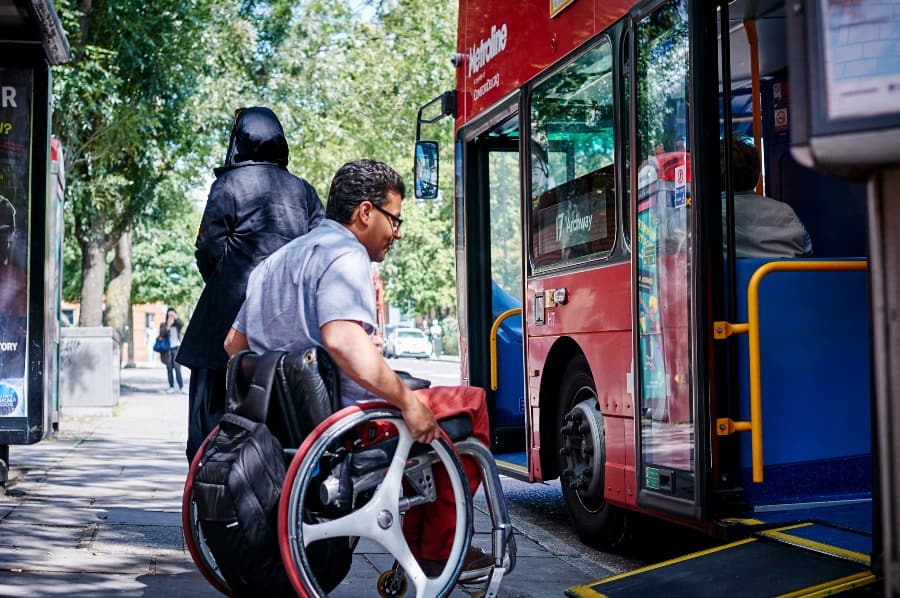RiDC launches Evidence Centre for Inclusive Transport with £20m grant funding from Motability
RiDC (Research Institute for Disabled People) is launching the UK’s first Evidence Centre for Inclusive Transport, with grant funding from Motability of £20 million over seven years.
RiDC is working in collaboration to develop and run the Evidence Centre with Coventry University, Designability and organisations Connected Places Catapult, Policy Connect, WSP UK.
The centre will work with disabled people, disabled people’s organisations, transport providers and policy makers to both undertake research and develop solutions which aim to make transport accessible for everyone.
Throughout an open and transparent grant competition process, Motability has worked with a panel of competition advisors, from research, policy, charity, and disability sector backgrounds.
Barry Le Grys, Chief Executive of Motability the charity, said: “After an extensive competition process, we are pleased to grant fund Coventry University, alongside RiDC, Designability, Connected Places Catapult, Policy Connect and WSP UK to run the UK’s first Evidence Centre for Inclusive Transport.
“The organisations bring their wealth of experience and expertise in transport design and the experiences of disabled people to help us to create longer-term solutions in travel accessibility.
“We know that being unable to make the journeys they want or need to, has a huge impact on disabled people’s daily lives; from getting a job, to attending medical appointments, to seeing friends and family. While some solutions exist to help make transport accessible, the fact that the accessibility gap hasn’t improved in a decade shows that much more needs to be done.
RiDC, will play a key part in engaging disabled people and ensuring they are front and centre of future disability and transport strategy, policy and practice. This will include developing and managing the CAT (Community for Accessible Transport) platform, user engagement and providing a synthesis of existing research publications.
Phil Friend, Chair of Trustees at RiDC said: “RiDC has a 50-year history in improving the consumer experience of disabled people and we are thrilled to be part of this consortium.
“We know there is no ‘one-size fits all solution’ here, and in working on the Evidence Centre we will be objective, independent and driven by the evidence.
“Our role is to ensure that it is disabled people themselves who express what’s needed, so we avoid ‘reinventing a bad wheel’ – as one of our panel commented.”
“The time is ripe, and we look forward to working on an initiative that we hope will improve the lives of the UK’s 14 million disabled people exponentially.”
The Evidence Centre aims to transform the transport sector’s understanding of disabled peoples’ experiences of transport and to take the opportunity of emerging technology advances in transport and low carbon ambitions to improve the accessibility and reliability of transport for disabled people.
The centre will convene disabled people and decision makers to drive for systems level change, helping realise Motability’s vision that no disabled person is disadvantaged due to poor access to transport.
Barry continues: “The competition process has attracted lots of interest across the transport and disability sectors, which is vitally important for making transport more inclusive. I look forward to seeing the positive changes the Evidence Centre will make by working with disabled people, disabled people’s organisations, transport providers and policy makers to make transport accessible for everyone.”
According to Motability’s Transport Accessibility Gap Report, disabled people make 38 per cent fewer journeys than non-disabled people – a figure that has not changed in the last decade. This “transport accessibility gap” tells us that there is much more that transport providers need to do to make sure that disabled people can travel across road, rail, and air with ease.
Motability are grant funding the Evidence Centre for inclusive transport with the primary aim of closing the transport accessibility gap.
Paul Herriotts, Professor of Transport Design in the Centre for Future Transport and Cities at Coventry University, said: “We are delighted at Coventry University to have been chosen to lead the Evidence Centre.
“We look forward to starting this exciting project for which we have great passion; it builds upon our strengths at Coventry University of teaching and research in transport design and our track record of applied research delivering real impact.
“We recognise the daily challenges still faced by disabled people in accessing transport in the UK, whilst this is a complex issue, it largely stems from today’s transport simply not being appropriate for the needs of disabled people.
“This poor provision of accessible transport leads to many disabled people facing real challenges in a range of key activities including education, employment, healthcare and being socially connected.
“Research is needed to better understand disabled peoples’ lived experiences, needs, and wants in relation to transport. The Evidence Centre will house and deliver future research – with this much-needed new approach: the generous funding from Motability enables us to undertake innovative applied research that puts disabled people at the heart of the process.
“We will look to disabled people to help guide and inform our activities and to help shape the future of public and private transport in the UK. The Evidence Centre looks to make a real difference and to drive change with the intention of positively transforming the lives of disabled people.”
The Evidence Centre is expected to launch in early 2023.



